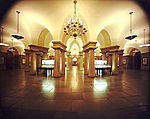United States Capitol rotunda

The United States Capitol rotunda is the tall central rotunda of the United States Capitol in Washington, D.C. It has been described as the Capitol's "symbolic and physical heart". Built between 1818 and 1824, the rotunda is located below the Capitol dome, which was built between 1857 and 1866. The rotunda is connected by corridors leading south to the House of Representatives and north to the Senate chambers. To the immediate south is the semi-circular National Statuary Hall, which was the House of Representatives chamber until 1857. To the northeast is the Old Senate Chamber, used by the Senate until 1859 and by the Supreme Court until 1935. The rotunda is 96 feet (29 m) in diameter, rises 48 feet (15 m) to the top of its original walls and 180 feet 3 inches (54.94 m) to the canopy of the dome, and is usually visited daily by thousands of people. The space is a national showcase of art, and includes numerous historical paintings and sculptures. It is also used for ceremonial events authorized by concurrent resolution, including the lying in state of honored dead.
Excerpt from the Wikipedia article United States Capitol rotunda (License: CC BY-SA 3.0, Authors, Images).United States Capitol rotunda
West Terraces and Steps, Washington
Geographical coordinates (GPS) Address Phone number Website Nearby Places Show on map
Geographical coordinates (GPS)
| Latitude | Longitude |
|---|---|
| N 38.89 ° | E -77.009 ° |
Address
United States Capitol
West Terraces and Steps
20534 Washington
District of Columbia, United States
Open on Google Maps







